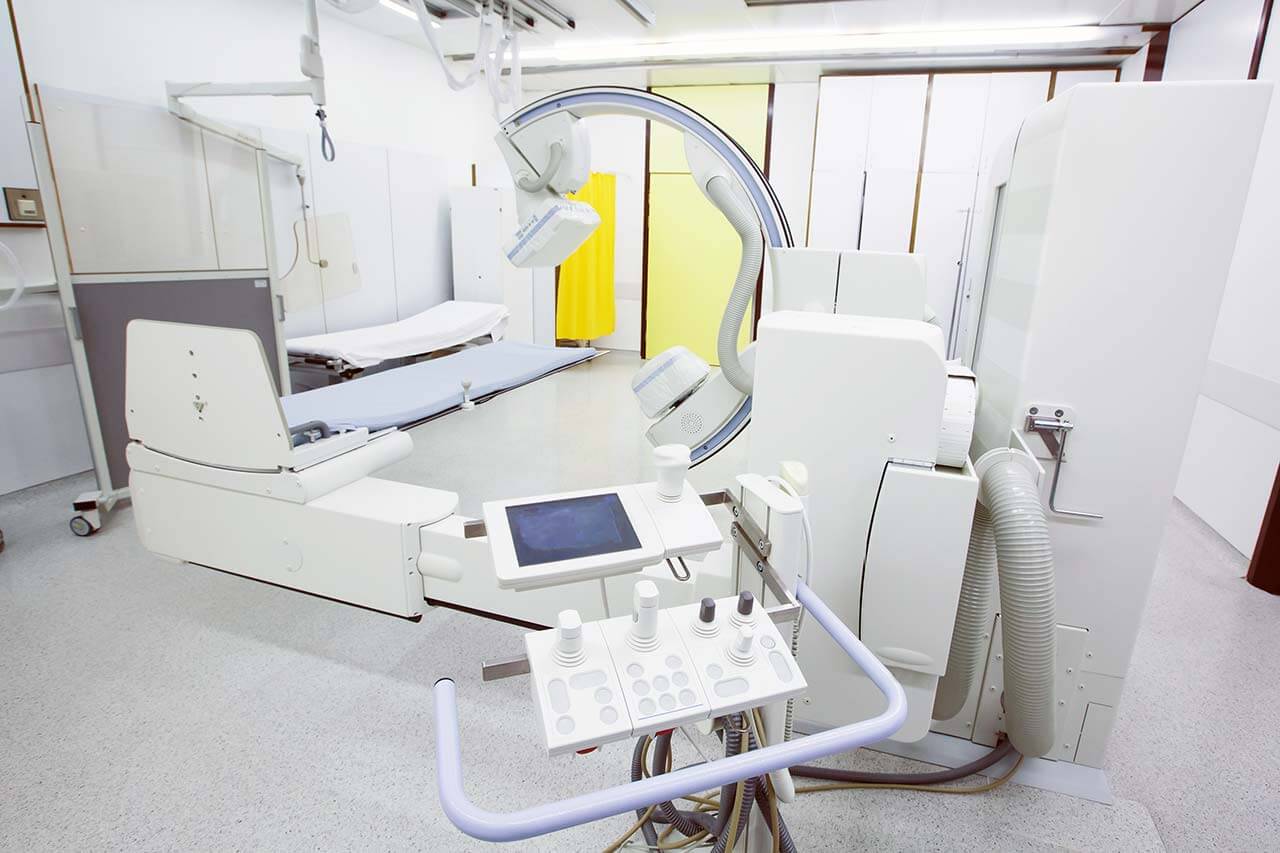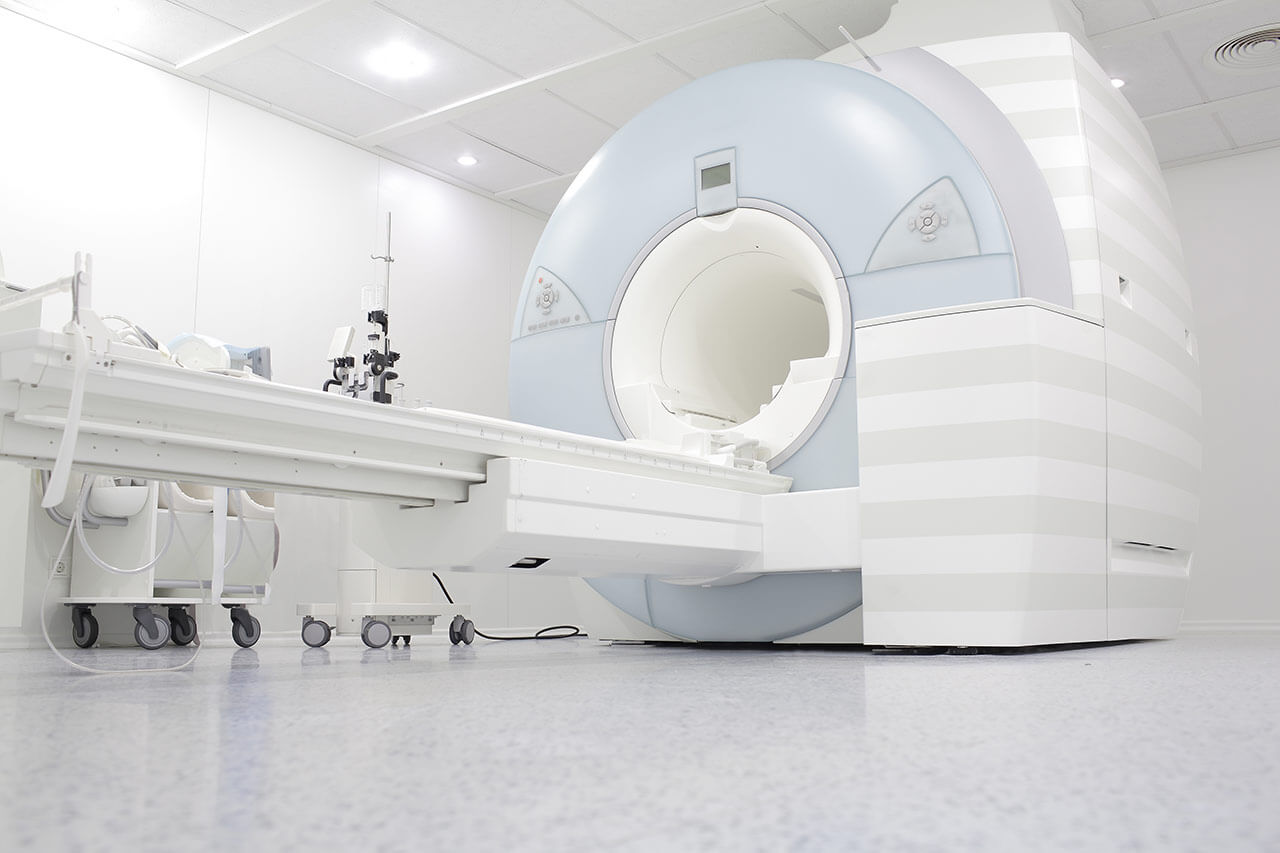
The program includes:
- Initial presentation in the clinic
- clinical history taking
- physical examination
- laboratory tests:
- complete blood count
- general urine analysis
- biochemical analysis of blood
- TSH-basal, fT3, fT4
- tumor markers
- indicators of blood coagulation
- CT scan / MRI of the abdomen
- abdominal ultrasound scan
- 1 course of chemotherapy
- nursing services
- consultations of leading experts
- explanation of individual treatment plan
How program is carried out
During the first visit, the doctor will conduct a clinical examination and go through the results of previous laboratory tests and instrumental examinations. After that, you will undergo an additional examination, including laboratory assessment of liver and kidney function, ultrasound scan. Based on the received results, the doctor will elaborate the chemotherapy regimen. If necessary, related medical specialists will be involved in the elaboration of a treatment regimen (tumor board).
Chemotherapy is carried out as the day hospital procedure, without mandatory admission to the hospital. After the placement of a venous catheter, you will stay in a comfortable ward. An infusion system will be connected to the catheter, through which the required drug or a drug combination will be administered. All drugs are administered by intravenous drip, slowly, so the total duration of the infusion can be up to several hours. All this time, doctors and nurses will monitor your health condition closely.
After the course of chemotherapy, you will stay under medical supervision in the ward for a few more hours. If your general condition is good, your doctor will allow you to leave the hospital. You will receive the medical report with detailed recommendations regarding further treatment. In the future, you will be able to have a distant consultation with your attending physician and schedule the next course of chemotherapy, if necessary.
Required documents
- Medical records
- MRI/CT scan (not older than 3 months)
- Biopsy results (if available)
Service
You may also book:
 BookingHealth Price from:
BookingHealth Price from:
About the department
The Department of Pediatric Hematology, Oncology and Stem Cell Transplantation in Children at the Hannover Medical School specializes in the diagnostics and treatment of the full range of solid malignant tumors and various types of blood cancers. In addition to the treatment of oncopathologies in childhood, the medical facility also performs all types of stem cell transplantation in young patients. A distinctive feature of the department is the combination of clinical activities with medical research, due to which it uses the advanced treatment methods for all oncological and hematological diseases in childhood. A multidisciplinary team of highly qualified physicians, including pediatric oncologists, hematologists, radiation oncologists, surgeons, pediatric psychologists, and experienced nursing staff takes care of the children's health. The department's doctors are guided by the recommendations of the German Society for Pediatric Oncology and Hematology (GPOH) in their work. The medical complex is one of the leading pediatric centers of this kind in Germany, and provides effective treatment of diseases of any severity. The Chief Physician of the department is Prof. Dr. med. Christian Kratz.
The department specializes in the diagnostics and treatment of all types of solid malignant tumors in children and adolescents. The most common pathologies in this field include sarcomas, liver cancer, thyroid cancer, neurinomas, nephroblastomas, malignant abdominal tumors, neuroblastomas, retinoblastomas and other tumors. To make an accurate diagnosis, a number of examinations are carried out, including laboratory tests, functional and imaging tests. The department has diagnsotic room with modern equipment for examining children. Based on the particular diagnosis, the stage of cancer, the age of the child, his general health condition and other factors, the interdisciplinary tumor board develops the optimal treatment regimen. As a rule, the doctors combine several therapeutic techniques: surgery, chemotherapy, radiation therapy, targeted therapy, stem cell transplantation and others. Psychologists are often involved in the therapeutic process, because after detection of cancer, both child and his parents experience an emotional shock, which can be difficult to cope with without professional psychological assistance.
The team of hematologists of the pediatric department treats benign and malignant pathologies of the hematopoietic system. These include leukemias, lymphomas, myelodysplastic disorders, blood clotting disorders, abnormalities of erythrocytes, platelets, granulocytes and lymphocytes, anemia, thrombocytopenia, etc., which occur in childhood and adolescence. The treatment of benign hematopoietic diseases is usually based on the use of classical and innovative drugs, including vitamin complexes. In the case of blood cancer, pediatric hematologists use more radical measures – chemotherapy and/or stem cell transplantation.
It is worth noting that the department is the only center in Lower Saxony specializing in hematopoietic stem cell transplantation in children and adolescents. The department's stem cell transplant team has an impressive clinical experience and achieves excellent success rates when performing the therapeutic procedure. In addition to conventional transplants, doctors also use cord blood and perform transplantations from haploidentical donors.
The department's range of medical services includes:
- Diagnostics and treatment of cancers in children
- Malignant tumors of bones and articular cartilage of the extremities
- Malignant brain tumors
- Malignant tumors of connecting and soft tissues
- Malignant tumors of peripheral nerves and autonomic nervous system
- Malignant tumors of the liver and other abdominal organs
- Malignant eye tumors (retinoblastoma)
- Diagnostics and treatment of hematological diseases in children
- Myeloid leukemia
- Lymphatic leukemia
- Non-follicular lymphoma
- Blood coagulation disorders
- Structural pathology of erythrocytes, platelets, granulocytes and lymphocytes
- Anemia
- Thrombocytopenia
- Diagnostics and treatment of other cancers and hematological diseases in children of all age groups
The department's therapeutic options include:
- Drug therapy
- Surgical resection of solid tumors (in collaboration with pediatric surgeons)
- Chemotherapy
- Radiation therapy
- Targeted therapy
- Stem cell transplantation
- Other treatment methods
Curriculum vitae
Higher Education and Postgraduate Training
- Study of Human Medicine at Universities of Bochum, Duesseldorf and Johannesburg.
- Professional training in Pediatrics at the University Hospital Duesseldorf.
- 1999 Dr. Mildred Scheel Foundation Scholarship for the implementation of a two-year research project on leukemia at the University of California in San Francisco.
- 15.03.2012 W3 Professor in Pediatric Oncology and Hematology.
- 22.12.2005 Habilitation and Venia Legendi.
Professional Career
- Since 2012 Chief Physician of the Department of Pediatric Hematology and Oncology, Hannover Medical School.
- 2009 - 2012 Research Fellow in the Department of Cancer Epidemiology and Genetics, National Cancer Institute, Bethesda, USA.
- 2008 - 2009 Head of the Department of Pediatric Hematology and Oncology, Wellington Hospital, Wellington, New Zealand.
- 2008 Invitation to the position of University Professor in Pediatrics at the University of Otago, Wellington, New Zealand, declined in 2009.
- 2007 Specialization in Pediatric Hematology and Oncology.
- 2005 Five-month scientific internship at the University of California, San Francisco (Scholarship of the Heinrich Kircher Foundation).
- 2005 - 2008 Senior Physician in the Department of Pediatric and Adolescent Medicine (specialization: Pediatric Hematology and Oncology) at the University Hospital Freiburg.
- 2002 Board certification in Pediatric and Adolescent Medicine.
- 1999 - 2000 Scientific internship in the Department of Pediatrics, University of California, San Francisco (Scholarship of the Mildred Scheel Foundation).
- 2001 - 2002 Research Fellow in the Department of Pediatric and Adolescent Medicine (specialization: Pediatric Oncology and Hematology) at the University Hospital Duesseldorf.
- 1998 - 1999 Research Fellow in the Department of Pediatric and Adolescent Medicine (specialization: Pediatric Oncology and Hematology) at the University Hospital Duesseldorf.
- 1998 Admission to medical practice.
- 1997 - 1998 Trainee Doctor in the Department of Pediatric and Adolescent Medicine at the University Hospital Duesseldorf.
Activities in Professional Organizations and Societies
- Chairman of Section II of the Senate of the Hannover Medical School.
- Editor of "Clinical Pediatrics".
- Head of the Working Group on Genetic Predisposition to Cancer in the German Society for Pediatric Oncology and Hematology (GPOH).
- Head of the Register of Fanconi anemia of the German Society for Pediatric Oncology and Hematology (GPOH).
- Co-Head of the Register of the Predisposition to Cancer of the German Society for Pediatric Oncology and Hematology (GPOH).
- Head of the Working Group on the Genome of the European Society for Paediatric Oncology.
- Member of the Board of Trustees of the German Childhood Cancer Foundation.
- Member of the Medical Advisory Board and Representative of the German Department of the Li-Fraumeni Syndrome Association.
Awards, Prizes and Honors
- 2010 Nih-Bench-to-Bedside Award.
- 2005 Kind Philippe Scientific Prize for research work in the field of pediatric oncology.
Photo of the doctor: (c) Medizinische Hochschule Hannover (MHH)
About hospital
The Hannover Medical School has the status of a leading German medical facility. The advanced medical technologies, highly qualified specialists, as well as productive research activities form a solid basis for top-class medical service of the world standard. The hospital is proud of its outstanding achievements in the treatment of cancer, diseases of the lung, heart, kidney, liver and metabolic disorders, as well as surgical diseases.
The medical facility diagnoses and treats more than 63,000 inpatients and about 470,000 outpatients annally. These indicators are growing steadily, which indicates the reputability and prestige of the hospital in the European medical arena.
For decades, the hospital has been a pioneer in transplantation medicine and is one of the leading centers of this specialization in the world. It performs about 400 transplantations of solid organs annually. Also, the hospital has performed over 130 bone marrow transplantations. In addition, the hospital ranks among the world leaders in cochlear implantation for the treatment of hearing loss.
Much attention is paid to interdisciplinary cooperation. Since 2016, the hospital has the largest certified Cancer Center in the Federal State of Lower Saxony, which provides comprehensive, multidisciplinary medical care in accordance with the standardized protocols of cancer societies.
The specialists of the hospital offer patients not only modern treatment of the highest quality, but also attentive care, sympathetic attitude to the patient's problems and understanding of his individual needs. Thus, the patient can be sure that his health is in the safe hands of highly qualified doctors.
Photo: (c) depositphotos
Accommodation in hospital
Patients rooms
The patients of the Hannover Medical School live in comfortable and cozy rooms. Each patent room has an ensuite bathroom with shower and toilet. A standard patient room includes an automatically adjustable bed with an orthopedic mattress, a bedside table, a wardrobe, a TV and a telephone. You can use TV, telephone and Internet using a special chip card, which can be purchased at self-service terminals or ordered at the service counter. The hospital allows the patients to use mobile phones, with the exception of intensive care units, some departments and diagnostic rooms.
If desired, the patient can stay in an enhanced-comfort room. Such rooms are distinguished by a more sophisticated design, and are additionally equipped with upholstered furniture, a safe for storing valuables and a mini fridge.
Meals and Menus
The patient and the accompanying person are offered delicious and balanced three meals a day. Breakfast and dinner are served buffet style and lunch can be chosen from three set menus. All dishes are prepared by professional chefs using the freshest ingredients available in the region.
If you are on a specific diet for some reason, you will be offered an individual menu. Please inform the medical staff about your dietary preferences prior to the treatment.
Further details
Standard rooms include:
Religion
There is a chapel on the territory of the hospital, where Christian and Catholic services are regularly held. The hospital provides a prayer room for followers of Islam, which is open for visits 24 hours a day.
Religious services can also be provided upon request.
Accompanying person
During an inpatient program, an accompanying person can stay with you in the patient room or in a hotel of your choice.
Hotel
During an outpatient program, you can stay in a hotel of your choice. The managers will help you choose the most suitable options.




